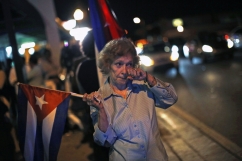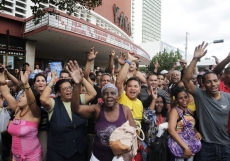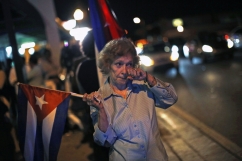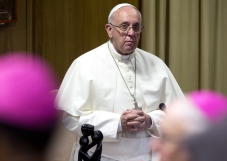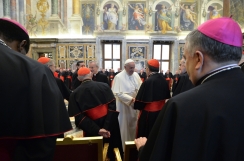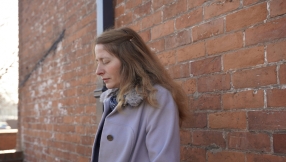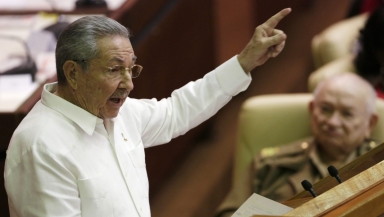
Cuba has released all 53 prisoners it had promised to free, senior US officials said, a major step toward détente with Washington.
The release of the remaining prisoners sets a positive tone for historic talks next week aimed at normalizing relations after decades of hostility, the officials said.
They described the Cuban government's release over the weekend of the last detainees on the list as a milestone but said they would keep pressing Havana to free more people the United States considers political prisoners.
The officials, speaking to Reuters on condition of anonymity, did not say how many prisoners were released over the weekend or identify them. But the White House will provide the names of all 53 to Congress and expects lawmakers to make them public, the officials added.
There had been questions over whether Havana would release all 53 prisoners as part of the deal Presidents Barack Obama and Raul Castro announced on December 17 to restore diplomatic ties that Washington severed more than 50 years ago.
Intense secrecy surrounding the 53, whose names have been withheld by both countries, had fueled skepticism over Cuba's intentions and played to critics who said Washington hasn't pressured Havana enough on human rights in exchange for normalizing ties and loosening economic and travel restrictions.
The US exchanged three convicted Cuban spies for an agent who had spied for the US government. The United States also received Alan Gross, a US aid worker jailed in Cuba.
The Cuban government informed the Obama administration over the weekend that the last of those on the list of prisoners had been released, and the US Interests Section in Havana, which handles consular affairs and other contacts for Washington, confirmed it, the officials said.
The US officials said they would pressure communist-ruled Cuba to release more prisoners.
"The fact of the matter is there are other individuals whose cases we have raised in the past," one of the officials said. "We have every expectation of going forward in the future. We're going to be wanting to raise the cases of different individuals who may be detained in Cuba for exercising their universal rights."
Cuba's government says there are no political prisoners on the island and typically describes dissidents as US-paid mercenaries.
"WE'LL SEE IN THE NEXT FEW DAYS"
Leading Cuban dissidents said that as of Sunday they had not received word that the prisoner release was complete and only knew of up to 39 people freed since December 17, including a popular hip-hop artist.
"We have heard nothing new today," said Elizardo Sanchez, president of the dissident Cuban Commission for Human Rights and National Reconciliation, which monitors detentions. "We'll see in the next few days if they complete the list."
Secrecy around the list has made it difficult for Sanchez and other dissidents to confirm a precise tally of those freed.
Speaking in detail on the prisoner release for the first time since last month's dramatic shift in Cuba policy, the US officials said the idea grew out of secret talks on how to release Gross and how to structure the spy swap.
As progress was made and both sides began seeing prospects for a broader rapprochement between the old Cold War foes last year, US negotiators sought proof of Cuba's readiness to improve its human rights record and last spring presented a list of prisoners they wanted to see released, the officials said.
The Cubans agreed to almost everyone on the list with the exception of a handful before the names were finalized. In July, they told Obama's aides that Havana was prepared to release 53 prisoners, the officials said.
A final meeting was held at the Vatican, where each side reviewed the different steps each side committed to take, including the Cuban prisoner release, the officials said, and then the broader deal was rolled out last month after 18 months of negotiations.
One US official also said Obama could exercise executive powers "in a matter of days and weeks" to begin easing some business and travel restrictions.
The officials said the first of those changes could be announced around the time of the Jan. 21-22 talks in Havana, when US Assistant Secretary of State Roberta Jacobson begins high-level negotiations on issues ranging from investments to immigration.
Reopening the US embassy in Havana for the first time in 53 years will also be a "near-term" focus for the administration and an issue that Jacobson will discuss with the Cubans, but there is no timeline, one of the US officials said.This official said the future of the US Naval Base at Guantanamo Bay, Cuba – long a sore point with the Havana government – was not "on the table" during last year's talks and that the United States has also made clear that it will continue its "democracy program" aimed at Cuba.
"You don't erase decades of mistrust overnight but you can chip away at it by taking steps to improve the relationship," the official said.
To make its list of prisoners to be released, the United States used information drawn from names of detainees provided by dissident activists in Cuba and human rights groups, and compiled names of what it considered to be core political prisoners who had been jailed for having peacefully exercised their rights of freedom of expression and assembly.
But it is unclear exactly how many dissidents are not on the list. Left out were the names of at least eight Cuban exile militants jailed on terrorism charges after they attempted to infiltrate Cuba with weapons, as well as 20 Cubans jailed on charges of attempting to hijack boats or planes. Also excluded, US officials say, were several Cubans jailed on unspecified charges of crimes against the state, including a handful of people believed to have spied for the United States.










